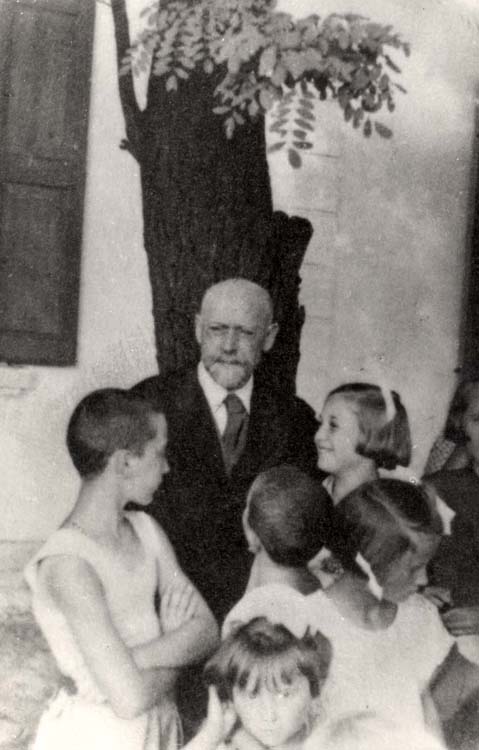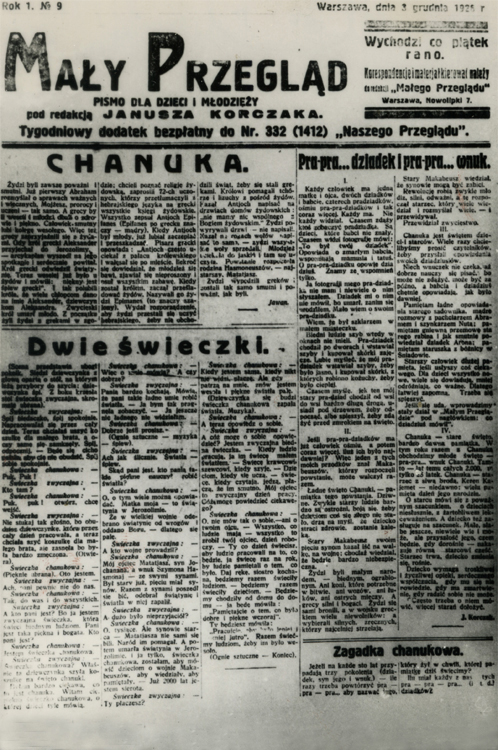- Ghetto Diary, p.166.
- Janusz Korczak, How to Love a Child, pp. 312-313.
1. Respect for the Child
At the center of Korczak's thought was respect for the child. He believed that in any educational setting, the adult-child relationship should be based on mutual respect and dialogue and not imposed from above. Korczak believed that each child is his own person and that every human being has a rich and complete inner world of his own. He believed that childhood is not a period to prepare you for life but it is an integral part of life itself. Everyone deserves to be treated with honor and respect with the inalienable right to develop his own interests.
Every child would develop according to his own interests and abilities and teachers should consistently show respect for the child's hard work. The goal of education is a dialogue and the child has his place in it. The adult should help the child be himself. The laws that the children should respect and obey need to be simple and clearly designed. And adults need to relate seriously to the child's private property. Korczak objected to the use of anything that was not based on dialogue. Many of the values included in his Child's Right to Respect were based on his experience of life in the orphanage. In his book King Matt the First from 1923 and King Matt in the Island from 1931 he tells of a child called Matt, a young prince who lost his father and became a king. The book follows him and what happened to him with his desire to establish a children's kingdom. Korczak based the rights of the children on this. He wrote them in 1929: the right for love and respect, the right to live in the present, the right to be loyal to yourself and the right to make mistakes, among others. UNESCO based its Rights of the Child, published in 1989 based on Korczak's ideas, which provide the essential rights for children of the world.
Points for Discussion in the Classroom:
Identify the main points in Korczak's emphasis on respect for the child. How do you relate to his ideas as expressed here?
2. Independence
For Korczak, the heart of the educational effort was to facilitate an independent learner with an active sense of responsibility through the child's own active role in the process.
In the orphanage everybody had obligations and they would take turns in the house keeping. The children, the educators and Korczak himself took part in the different chores such as cleaning and peeling potatoes. There was a rotation of roles with everyone doing all the tasks in turn... When a child finished doing his job he would get a postcard. The picture on the cards would be related to the task. For example, for peeling 200 pounds of potatoes they would get a "flower card"; for looking after small children and new arrivals a "good care card", and more. (From Korczak's, How to Love a Child, p. 353.) The children valued these postcards and took care of them .For every half an hour of work the children would get a postcard. Five hundred postcards of different kinds (there were simpler ones and ones regarded as more valuable) would be worth one postcard of flowers and whoever had 12 flower postcards got a crown. The worker who held a crown had special privileges and was also rewarded with a monetary prize. The postcards gave significance to their daily work and contributed to a positive work ethic.
"My aim is that in the Children’s Home there should be no soft work or crude work, no clever or stupid work, no clean or dirty work. No work for nice young ladies or for the mob. In the Children’s Home, there should be no purely physical and no purely mental workers."1
Points for Discussion in the Classroom:
- For Korczak it was important to teach the children to tie their shoelaces, to polish their shoes and to brush their teeth. Why do you think these prosaic daily activities were so important in Korczak's educational approach.
- How do the postcards encourage children to become independent? Why do you think the children so valued these postcards?
3. Democracy and Self –Government
Korczak believed that in progressive education there should be an emphasis on democracy and equality. He asked the children to participate in the management of the orphanage and in this way he implemented equality and self- government. He also established a children's court in the orphanage. Korczak dreamed of releasing the child from dependency on the adults. With regards to the court, he maintained that proximity in age between the accused and the judge would engender justice which is why he attached special importance to the children's court in the orphanage. The court had 5 judges chosen from among the children in a lottery. One of the educators held the position of the court's secretary, but he could not vote. His task was to gather all the testimonies from the children. Children and adults were brought to court for their faults and everyone was committed to stand by the ruling handed down. The rulings were given according to a set of laws and whoever didn’t agree with the ruling, could ask for a review after a month. Informing on other children or bullying and laughing at another child were instances dealt with by the court. Setting new rules for offenses such as being late, making noise or not obeying the teachers and people in charge (also if they were children filling one of their working roles), was an additional function of the court. Korczak accused himself six times for different infractions during the first six months of the orphanage.
"If I am devoting a disproportionate amount of space to the Court, it is because I believe that it may become the nucleus of emancipation, pave the way to a constitution, make unavoidable the promulgation of the Declaration of Children's Rights. The child is entitled to be taken seriously, that his affairs be considered fairly. Thus far, everything has depended on the teacher's goodwill or his good or bad mood. The child has been given no right to protest. We must end despotism."2
Korczak was also innovative with new arrivals. Each new child would receive an older student as a guardian tutor for 3 months. He would explain the rules of the institution to the new child and would defend him from children that might bully him. He would keep a diary where he would write what happened to the new child and his thoughts on the child's absorption.
Korczak and Stefa read them and wrote comments about everything. A year after a new child came to the institution there was a survey among the children to see if he could stay in the orphanage.
Points for Discussion in the Classroom:
- How did the child benefit from the children's court?
- Why was it important for Korczak to put himself on the accused bench in the court? What did he want to impart to the children in this unusual step?
4. Freedom to Create
In 1926 Korczak started a newspaper, (The Little Review), as a weekly supplement to the daily Polish-Jewish Newspaper Nasz Przegląd (Our Review) which was one of its kind – it was written for children by children.
Korczak was the editor of the newspaper's supplement for around two and a half years. In it, he published only things written by children. It was important for him because it was "for children, by children". His aim was to create a place for self- expression, a place that would answer their questions and give them further independence. The young writers wrote about subjects that interested them like problems they had with their parents and teachers. There was also a writing competition. The children that wrote in the newspaper got a postcard of recognition for doing so. Korczak said that, "I fully believe that there is a need for magazines for children and written by children..." The Little Review, first edition, 1926. The newspaper existed until the start of the war in 1939.
There was also a children's newspaper in Korczak's orphanage. It covered the court, the judgments and the week's activities.
The children also performed plays. The last play that was performed was "The Post Office" by the Bengali playwright Rabindranath Tagore. The play was staged in the orphanage by the theater class of 1942 during the big deportation taking place in the ghetto. On the 15th of July 1942, Korczak sent out invitations for the performance. The Post Office is a play in two acts. Its story is about a young Indian boy called Amal whose role was played by a child called Abrasha and whose performance left everyone impressed.
Amal had a terminal illness. A post office opened next to his house and Amal waits in his bed for a letter from the king wishing he will fall asleep forever with a smile.
The children in the orphanage identified with Amal and with bated breath they awaited, together with Amal for the king’s letter that would spell redemption.
Korczak wanted his children to learn how to welcome the Angel of Death calmly and this was
his way of conveying this message.
Points for Discussion in the Classroom:
- What in your opinion is so special about the children writing their own newspaper?
- Why did he choose to stage "The Post Office"?
5. Games and Play
Korczak recognized the importance of games and play in the lives of children. In the orphanage he organized specific times for play, for excursions and for sport. Group games engendered group solidarity and allowed for expression of the individual. Korczak himself took part in the games and played with the children. Korczak thought that for the child, play is a very serious thing in which he/she invests effort and this was to be noted and not disregarded.
"A game is not so much the child's medium as the only sphere in which he is allowed to display more or less initiative. When participating in a game, the child feels to some degree independent. Everything else is a transient favor, a temporary concession, whereas to play is the child's right." From Janusz Korczak, How to Love a Child, p.158
Points for Discussion in the Classroom:
Think about your group games- what values do they teach?





![A postcard from the youth and children's weekly "Maly Przeglad" [The Little Review], given as a memento to Edwin Markuze. Dated May 1927 A postcard from the youth and children's weekly "Maly Przeglad" [The Little Review], given as a memento to Edwin Markuze. Dated May 1927](https://www.yadvashem.org/sites/default/files/picc.jpg)



